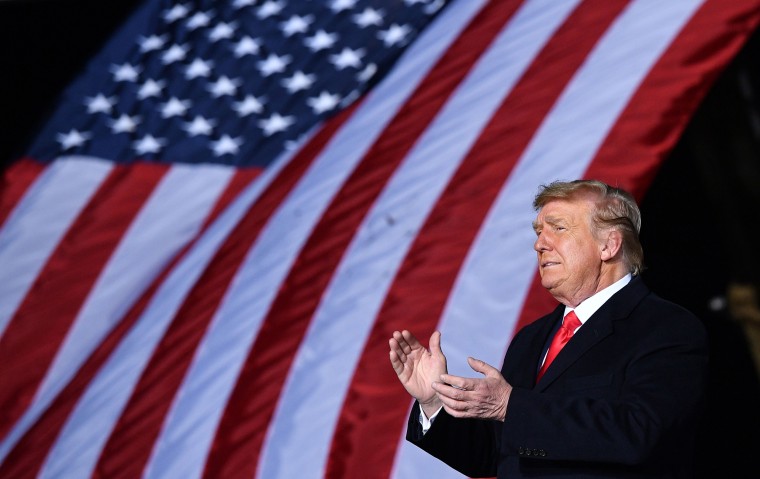EDITOR'S NOTE (March 15, 2021, 5:37 p.m. ET): A previous version of this article misquoted the exact words of then-President Donald Trump during a phone call in December with a Georgia elections investigator, per a source. According to newly released audio of the call, Trump did not tell the investigator to “find the fraud” or say that she would be “a national hero” if she did so. Rather, he urged her to scrutinize a county where he said she would find “dishonesty,” said that the investigator had “the most important job in the country right now” and said that “when the right answer comes out, you’ll be praised.” The article has been updated to remove the inaccurate quotes. An article on the newly released audio is here.
WASHINGTON — President Donald Trump pushed Georgia's lead elections investigator in a phone call in December to look for evidence of fraud in the presidential race, according to newly released audio of the call.
The call is another recent example of Trump's efforts to overturn the results of the November election, particularly in Georgia, where President-elect Joe Biden beat him by nearly 12,000 votes, becoming the first Democrat to win the state in decades.
The call was first reported by The Washington Post. Georgia Deputy Secretary of State Jordan Fuchs confirmed to NBC News that the call took place. But the newly released audio contradicts Fuchs' account at the time of what Trump said on the call.
Since the race was called for Biden on Nov. 7, Trump has made at least three calls urging Georgia officials to produce evidence of widespread fraud to overturn the results. The first call was made to Republican Gov. Brian Kemp in early December, followed by the call to the elections investigator, Frances Watson, and a call to Georgia Secretary of State Brad Raffensperger.
Trump called Watson in December while she was leading an inquiry into allegations of ballot fraud in Cobb County.
Raffensperger told The Post in an interview that he felt it was inappropriate for Trump to have interfered with the case, but he added that he was unaware of what was specifically discussed on the December call.
"That was an ongoing investigation," Raffensperger told The Post. "I don't believe that an elected official should be involved in that process."
Raffensperger announced an audit Dec. 14 of the November election in Cobb County after it was alleged that some ballots were accepted without proper signature verifications. The Georgia Bureau of Investigation announced Dec. 29 that it had found only two mismatched signatures among the more than 15,000 votes in the audit.
The inaccuracy came from a woman who signed her name to ballots for both her and her husband, Raffensperger said at the time.
In the phone call with Raffensperger, which took place Jan. 2, Trump urged him to alter the vote total and launched into a barrage of discredited conspiracy theories about the election. NBC News obtained a recording of the phone call, which was first reported Jan. 3.
Trump has been obsessively working to contest the election results since news outlets began projecting Biden as the winner. He and his allies filed over 50 lawsuits across the county, almost all of which have been unsuccessful.
Trump has been particularly fixated on overturning the results in Georgia after he become the first Republican presidential candidate in nearly 30 years to lose the state.
Trump has targeted Raffensperger and other top Georgia Republicans, including Kemp and Lt. Gov. Geoff Duncan, lashing out at them on Twitter and threatening to derail their political careers.
Trump has yet to formally concede the race to Biden, but he finally committed to "an orderly transition" of power Thursday, a day after a violent mob of his supporters stormed the U.S. Capitol to interrupt Congress' joint session ratifying the election results. Five people, including a Capitol Police officer, were killed.
Biden will be sworn into office Jan. 20.

